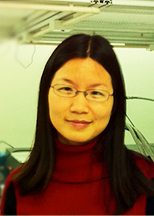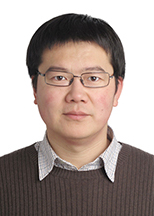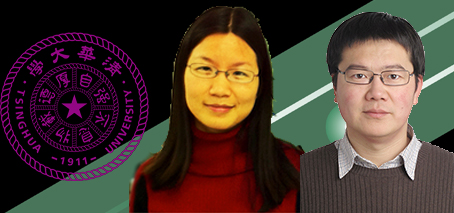FLEET’s fruitful relationship with Tsinghua University (Beijing) has been expanded, with the Centre welcoming two new Partner Investigators to lead research collaborations.
 Prof Shuyun Zhou studies the electronic structure of novel two-dimensional materials and heterostructures using advanced electron spectroscopic tools, including angle-resolved photoemission spectroscopy (ARPES), spin-resolved ARPES, nano-ARPES and ultrafast, time-resolved ARPES. She has made important progress on the electronic structure of novel transition metal dichalcogenides, type-II topological semimetal and van der Waals heterostructures. Link to research page. Within FLEET, Prof Zhou will work closely with Michael Fuhrer (Monash University) on 2D deposition.
Prof Shuyun Zhou studies the electronic structure of novel two-dimensional materials and heterostructures using advanced electron spectroscopic tools, including angle-resolved photoemission spectroscopy (ARPES), spin-resolved ARPES, nano-ARPES and ultrafast, time-resolved ARPES. She has made important progress on the electronic structure of novel transition metal dichalcogenides, type-II topological semimetal and van der Waals heterostructures. Link to research page. Within FLEET, Prof Zhou will work closely with Michael Fuhrer (Monash University) on 2D deposition.
 Prof Pu Yu studies emergent phenomena at the interface of correlated electron systems. His expertise in complex oxides complements FLEET efforts to use complex oxides as platforms for topological devices, through introduction of ferromagnetism to other 2D materials, through patterning of charge in ferroelectrics, and potentially by realising new topological states in oxides or oxide. He leads cross-correlated interface research at RIKEN Center of Emergent Matter Science. Link to his research page. Prof Yu will work closely with Xiaolin Wang (UOW) and Nagy Valanoor (UNSW) on ferroelectrics.
Prof Pu Yu studies emergent phenomena at the interface of correlated electron systems. His expertise in complex oxides complements FLEET efforts to use complex oxides as platforms for topological devices, through introduction of ferromagnetism to other 2D materials, through patterning of charge in ferroelectrics, and potentially by realising new topological states in oxides or oxide. He leads cross-correlated interface research at RIKEN Center of Emergent Matter Science. Link to his research page. Prof Yu will work closely with Xiaolin Wang (UOW) and Nagy Valanoor (UNSW) on ferroelectrics.
As new FLEET PIs, Professors Zhou and Yu join Prof Qikun Xue, who coordinates the collaboration between Tsinghua and FLEET, including a significant exchange program of student and postdoctoral researchers.
FLEET (The Australian Research Council Centre of Excellence in Future Low-Energy Electronics Technologies), which was officially opened 12 June 2018, is a collaboration of more than 100 researchers at seven Australian universities and 15 Australian and international science organisations.
The Centre’s mission is to develop a new generation of ultra-low energy electronics, using cutting-edge new fields of physics. The impetus behind such work is the increasing challenge of energy used in computation, which uses 5–8% of global electricity and is doubling every decade.
FLEET’s national and international partners are: the Australian Nuclear Science and Technology Organisation (ANSTO); the Australian Synchrotron; the Beijing Computational Science Research Center (CSRC), California Institute of Technology (Caltech); Columbia University, New York; Johannes Gutenberg University, Mainz; University of Maryland Joint Quantum Institute & National Institute of Standards and Technology; Max Plank Institute of Quantum Optics; the National University of Singapore; University of Colorado, Boulder; University of Maryland Center for Nanophysics and Advanced Materials; University of Texas, Austin; Tsinghua University, Beijing; University of Camerino; University of Wurzburg and Wroclaw University of Science and Technology (WUST).
See full list of FLEET’s Partner Investigators

